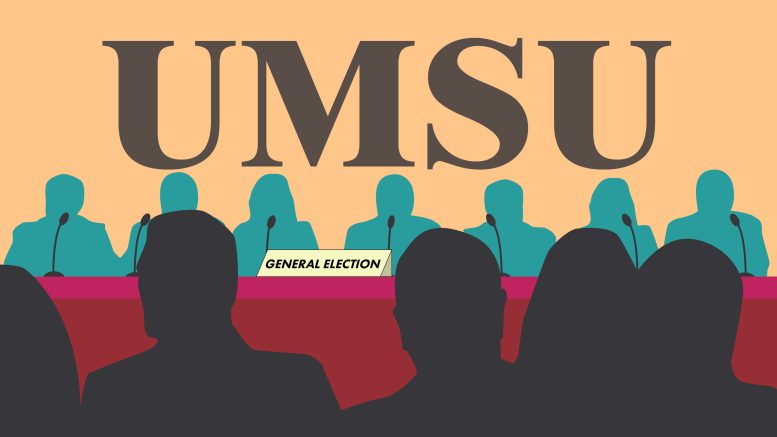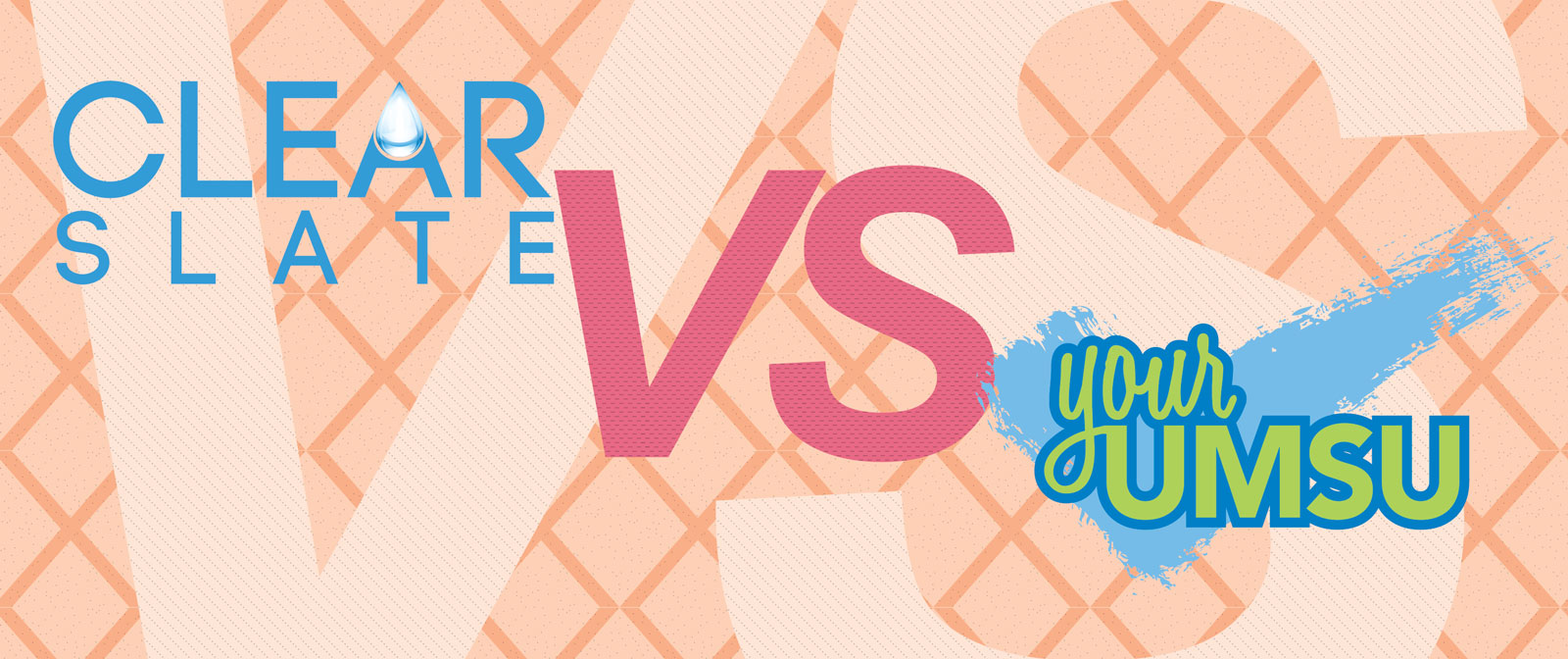Candidates for vice-president student life
Tracy Karuhogo
A third-year psychology student, Tracy Karuhogo is currently UMSU’s womyn’s community representative.
She has also served on student council for the International College of Manitoba and worked as an outreach coordinator for Justice for Women and a facilitator for Bringing in the Bystander, a workshop dedicated to teaching community members how they can help prevent sexual violence.
Karuhogo wants to be VP student life in order to revive student life on campus after two years of online learning and, if elected, hopes to highlight the importance of the social aspects of university.
She hopes to increase students’ engagement with student clubs and associations by providing students with an automated list of clubs they can easily access. She also pointed out students often have trouble accessing funds for clubs.
“So, one of my biggest [issues] is making it easier for them to get these funds, making it easier for them to have access to spaces on campus,” she said.
Karuhogo said that while the U of M has more than 100 student clubs and 28 associations, “the truth of the matter is most students don’t know about these clubs, they don’t know how to join them, they don’t know, when they come on to campus, where [to find them].”
As a student from Uganda, Karuhogo is also passionate about international students’ issues.
One of her “biggest priorities” is public health care for international students after the Progressive Conservative government denied international students access to universal health care in 2018. She works with campaigns to advocate for international students’ health care.
She also hopes to establish an annual cultural week at the university, highlighting the traditional cultures of international students to help them feel less homesick and encourage cultural exchange.
“When international students speak about the issues they are facing, they are not new to me because I am facing them,” she said.
Mohamed Soussi
Mohamed Soussi is a fifth-year student pursuing a major in political science and a minor in psychology. He has sat on the board of UMSU for the past three years, serving as governance co-chair and as chairman.
He has worked as director of finance, interim treasurer and vice-president external with the Muslim Students’ Association (MSA).
He also served as executive advisor for University 1 Student Council, providing guidance based on his experience dealing with UMSU while working with the MSA.
“I’ve been a student advocate for almost four years now and I’ve had the absolute distinct honour to see […] in detail how our institution functions on campus, their successes […] and the areas which can be improved,” he said.
Soussi highlighted mental health as a central issue of his campaign, saying he was inspired to run for office after he and his friends struggled to access mental health services throughout the pandemic and saw room for improvement.
“I want to lobby for even more mental health resources because, to this day, it still takes way too long to see a mental health professional, which in my view is completely unacceptable,” he said.
“Through my work as [vice-president student life] I want to be able to lobby, whether it’s the administration [or] the province, for more mental health resources and access because right now it’s just such a neglected part of our health care.”
If elected, Soussi hopes to soften the financial blow for students coming to campus for their first time, many of whom may not have budgeted for some expenses of in-person learning, such as transportation.
“The hardship fund is something I want to make sure is there because it’s so easy to say, ‘Now that […] we’re all in person, [we’re] going back to normal,’” he said. “That’s not true […] The reality is, at the end of the day, there will be new costs.”
“We only get this one chance to get back to in-person learning and I have no intentions to squander that opportunity.”
Candidate for vice-president finance and operations
Brook Rivard
Brook Rivard is a mechanical engineering student with a focus in aerospace. He is currently running unopposed for re-election as UMSU’s vice-president finance and operations.
Rivard says his time in the role of vice-president finance and operations in the past year gives him “excellent hands-on experience” for the job.
“Being able to jump right into the role and avoid those first couple of months where you’re getting your bearings and learning how the different processes work is certainly an advantage,” he said.
Rivard has also served two years as the Arts Student Body Council’s director of finance, as well as the Resident Students’ Association Council director of finance for a year and also acted as treasurer for the university’s anime club and Model UN Club for a year each.
Rivard is eager to continue his work as vice-president finance and operations, saying that with COVID “stretching longer than initially hoped,” many aspects of the job and UMSU’s work more broadly were limited.
He considers low student engagement with UMSU to be his most pressing issue.
“We see it in lower turnout to events on campus, a disconnect between students and what is happening on campus,” he said.
“Even here in the election, the only reason I see for any position to be unopposed is that students just aren’t fully engaged with what UMSU is or what we do.”
Rivard said UMSU offers many good financial supports for students, but the difficulty is raising awareness of these programs among students.
“Making it more clear what options are available to students is the most immediate and, in my opinion, the most sound way to financially support students,” he said.
“Currently at UMSU, we’re going through the participatory budgeting process. This year, we’ve opened it up a bit more in a unique way [by] offering students the full ability to offer up where they feel funding can best be put going forward instead of what the practice has been in the past couple years of just offering four or five different options to be voted on.”
Rivard hopes students will come out to vote and reminded them the easiest way to stop receiving reminders to vote in their email is to simply “take the 30 seconds to vote.”
Candidates for vice-president advocacy
Liam Pittman
A third-year student majoring in sociology, Liam Pittman has held various roles at varying levels of student government at other institutions, which has provided him with experience analyzing and drafting policy.
“As vice-president advocacy, it’s not about what you want and what you think is best, it’s about putting the needs and the wants of others above your own personal agenda,” he said.
Pittman thinks student advocacy is more than important than ever.
“A lot of students have been affected by the very difficult past two years that we’ve all gone through together, but the bottom line is, I want to make an impact on my peers and to help make their university experience a better one that prepares them for life after university,” he said.
He highlighted the fact that international students can no longer access universal health care in the province.
“Lobbying is a big part of the role as vice-president advocacy, so — alongside the Manitoba Alliance of Post-Secondary Students — I plan to lobby the provincial government and do everything in my power to reinstate them back on the provincial health-care plan,” he said.
“As an immigrant to Canada myself, I can really empathize with them. There was a period […] where I wasn’t covered by the health-care plan due to my visa status, so I know the struggles and the worries that they’re going through and I absolutely will do everything in my power to get them back on.”
He also pointed out students are struggling financially with the pandemic and rising inflation.
“The 2021-22 budget was approved by the board of governors for $660 million and [they] decided that the university would increase the tuition by almost four percent,” he said.
“My plan is to fight against that four percent raise in tuition and to lower the students’ tuition. That will save the students an estimated $14.9 million and in a $660 million budget I think the university could find other areas to balance the budget out and should not place that burden onto the students.”
Pittman hopes students will come out to vote, no matter who they choose.
“It’s incredibly important because who you elect directly impacts your university experience.”
Victoria Romero
A second-year arts student studying political studies with a minor in history, Victoria Romero has experience working with both partisan and non-partisan work with the government, such as working as a provincial page in the legislature and a constituency assistant for political parties in the province.
She also has six years of volunteer work for the St.Amant Research Centre and has volunteered with Sara Riel Inc. — a mental health support group — and the North Point Douglas Women’s Centre.
Romero said she is running because she believes in the power of students when they stand together in a “politicized union.”
“I’m not someone that’s afraid to speak out against governing bodies who are putting forward anti-student legislation,” she said.
She said the most important issue she wants to highlight is restoring international students’ access to free health care after the province denied it to them in 2018 — a move she called “extremely cruel and inhumane.”
“Our international students contribute so much to our society [and] economy and […] they already have so many other expenses to deal with living in a completely foreign country,” she said.
“They should at least get health care — health care is a human right.”
Romero said she would lobby hard against any tuition increases and oppose the government’s attempts to introduce performance-based funding, which she said would make the university “less inclusive.”
She said UMSU’s approach to dealing with the government has been too “friendly.”
“I know that it’s scary to stand up and voice a strong opinion — especially when that can sometimes mean being left out of a conversation and not getting a seat at the table — but the power of our student union is so extremely strong and when we stand together united and push for what we actually want, what is accessible for all and not just inclusive to some, we can achieve it.”
Candidate for vice-president community engagement
Elishia Ratel
Elishia Ratel is in her fourth year studying classical percussion in the Desautels Faculty of Music and has served as a senator and director of communications for the organization for two years. She is also currently a marketing assistant for UMSU.
She highlighted her knowledge of policy and procedure as a senator for the music faculty students’ association, as well as her experience with communications and using social media to market events in both this position and her work with GroundSwell, a local music and arts organization.
Ratel hopes to become vice-president community engagement because she is “passionate about building community and creating meaningful experiences for students.”
“I’d like to [strengthen] our campus community by engaging the student body at every level of activity,” she said.
“I believe that students should enjoy their time at university and having fun is an important piece and so is connecting with students at deeper levels with the issues that matter to them.”
Ratel said she is “really keen” to support the initiatives of student clubs and associations.
“These smaller groups are where students feel the most connected,” she said, “it’s their hub, their place to call home and I really want to support these groups financially and through UMSU’s marketing, whether it be social media, newsletters, websites, you name it.”
Ratel wants to ensure events on campus are COVID-safe use them to help students easily transition to campus life, with information and resources available for students online and in-person.
She also wants more trained councillors to be available to provide support for students and more accommodations for those who are absent due to illness, such as recorded lectures.
“If something matters to students, I’m here to listen, to take action and to work with them to realize [their] ambitions.”




